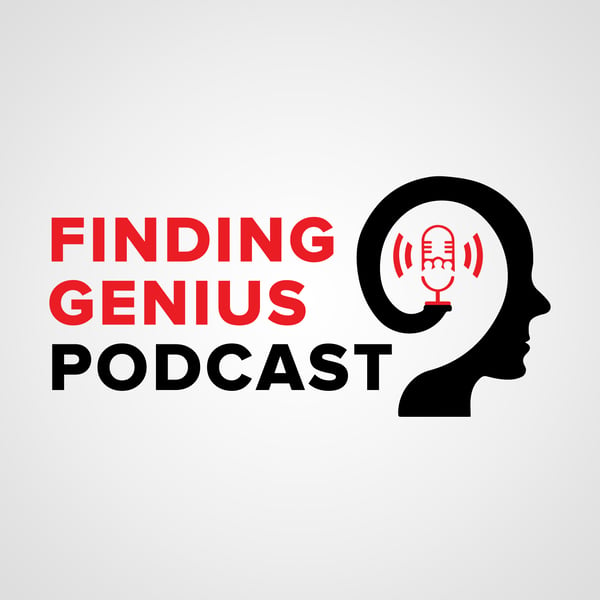MicroRNAs in Human Cancers with Researcher George Calin
Finding Genius Podcast
Richard Jacobs
4.4 • 1K Ratings
🗓️ 11 May 2021
⏱️ 39 minutes
🧾️ Download transcript
Summary
Ninety-eight percent of the human genome is non-coding. The majority of our DNA instructs and regulates the other two percent. Until recently, this ninety-eight percent was considered junk DNA and held a mystery of purpose akin to dark matter. George Calin opens the mystery for listeners and explains how researching non-coding RNAs will lead to better cancer treatments.
Listen and learn
- How non-coding RNAs stay in the nucleus and other mechanistics,
- Why early earth was an “RNA world,” and what that indicates about the evolution of life,
- How non-coding RNAs are considered “double phase” and why that’s significant for therapeutics and mRNA vaccines, and
- How his research on non-coding RNA biomarkers in body fluids should lead to targeted interventions.
George Calin is a principal investigator with the MD Anderson Cancer Center at the University of Texas. He specializes in how non-coding RNAs impact disease and virus mechanisms, specifically the role of microRNAs in human cancers. He also looks at what they can tell us about how bad and aggressive a particular disease will be for a specific individual. He notes that “a specific type of cancer with a specific localization at a specific stage. . . can behave very differently in another patient” with the same profile. “One is surviving, let's say one month, and other is surviving three years,” he adds, and researchers want to know why.
He says that mRNAs may have the answers and could point doctors in the direction of how to help both patients. It could lead to more aggressive measures when the biomarkers point toward that necessity, for example. Because cancer is a genetic disease, understanding the complexities of genes and genomics is vital to its treatment. By studying how and why and when abnormalities are expressed and what these non-coding RNAs are instructing, researchers can open up an entirely new way to treat cancers. He says that some of this biomarker identification is already in use for some bladder cancers.
Listen in for more on how advancement in studying the smallest parts of us may make the biggest difference.
Episode also available on Apple Podcasts: apple.co/30PvU9C
Transcript
Click on a timestamp to play from that location
| 0:00.0 | Forget frequently asked questions. Common sense, common knowledge, or Google. How about advice from a real genius? |
| 0:07.0 | 95% of people in any profession are good enough to be qualified in license. 5% |
| 0:12.0 | Go above and beyond. They become very good at what they do, but only |
| 0:15.0 | 0.1% are real geniuses. Richard Jacobs has made it his life's mission to find them for you. |
| 0:22.0 | He hunts down and interviews geniuses in every field. Sleep science, cancer, stem cells, ketogenic diets, and more. |
| 0:28.0 | Here come the geniuses. This is the Finding Genius Podcast. |
| 0:33.0 | The Richard Jacobs. |
| 0:37.0 | Quick note before we begin. The Finding Genius Foundation, as part of the Finding Genius Podcast, has recently completed a book about understanding viruses. |
| 0:45.0 | So the creation of this book was to interview 100 virologists, ask them a lot of deep difficult questions, |
| 0:52.0 | take the most difficult questions, and then re-interview the top 25 or so, and ask them the hardest questions I could think of. |
| 0:59.0 | And we compile that all into a book. So you'll see question and four or five experts answers. |
| 1:04.0 | Question four or five experts answers. There's about 30 questions in the book. I think it's a great read for the layperson and for the researcher. |
| 1:11.0 | Talks about a lot of speculation in the world of viruses, such as, are they alive or not? And why is it important? |
| 1:18.0 | Why do viruses go latent or hidden or uneffective or sit in a person or an animal or another creature for weeks, months, years, and then suddenly become virulent and affect that person? |
| 1:29.0 | So there's a lot of really provocative questions in the book. It's now on Amazon. So if you go to Amazon and type in Finding Genius, you'll see the book on viruses. |
| 1:37.0 | It's also on Kindle. The audible version is in production and should be ready in approximately a month. |
| 1:42.0 | But if you want to go and order it now, you can do so again by going to Amazon or Kindle or go to FindingGeniusFoundation.org and go to publications. |
| 1:51.0 | There's an opportunity as well to get the transcripts of all the interviews and to hear the original interviews themselves. |
| 1:57.0 | If we put them all together, the book would be about a thousand pages, but we condense them down to make it juicy and concise and tight and very interesting. |
| 2:05.0 | So I hope you'll check out the book. We're now working on one about cancer. |
| 2:09.0 | But this is going to be your goal is three times a year to come out with these masterclass books that I think will inspire new scientific research. |
| 2:16.0 | And I hope you'll check it out. Thank you. |
... |
Please login to see the full transcript.
Disclaimer: The podcast and artwork embedded on this page are from Richard Jacobs, and are the property of its owner and not affiliated with or endorsed by Tapesearch.
Generated transcripts are the property of Richard Jacobs and are distributed freely under the Fair Use doctrine. Transcripts generated by Tapesearch are not guaranteed to be accurate.
Copyright © Tapesearch 2025.

